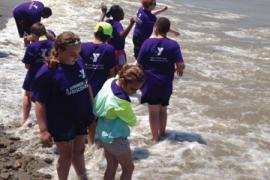After a long day of exercise and fun at camp, children’s eyes can be much bigger than their stomachs! Camps across the country are encouraging children to put on their plates only what they will eat, then camps teach children about recycling by converting the leftovers into compost. The compost is then used to fertilize the fields that create food for the campers!
Many camps implement an environmental awareness program entitled, "Leave No Trace." This program teaches and encourages children to clean up after themselves in nature, so as to not pollute the environment.
Some camps feature marine science programs, allowing campers to get a hands-on experience with marine life.
While many would consider a traditional camp experience as an escape from technology, the digital world, and even electricity, some camps are actually on the forefront of technology! Many camps are taking part in revolutionary waste water treatment centers, which purify the water and create wet land systems, many camps then use the purified water to irrigate farm ground.
Many camps are getting down and dirty to teach young people about the environment, encouraging campers to get an up-close-and-personal study of ecology by actually getting into ponds and examining the pond’s aquatic life.
Camps create educational programs with local wildlife agencies or even the Environmental Protection Agency (EPA).
A sustainable forest is one that continues to produce and thrive… lack of trees leads to erosion and biodiversity loss on the site. Camps are often the perfect place to practice healthy forests. Many camps participate in replanting programs and gently expand their physical growth to accommodate existing trees. Some camps offer campers opportunities to learn about the camp’s forest through activity offerings, extended time in the wooded area, and direct interaction with service projects.

